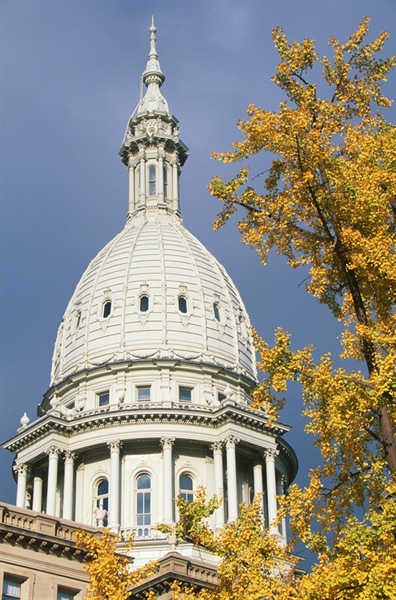
Michigan government’s $56.8 billion budget for Fiscal Year (FY) 2019 rumbled through the House and Senate Tuesday with record levels of education and transportation money, but with pointed concerns from Democrats about “raiding” $900 million in K-12 money to bail out the stagnant General Fund.
Lower social welfare caseloads and higher-than-expected state revenues allowed Republican leadership to sink $330 million more than expected into the roads, $60 million to upgrade school security and pad the state’s Budget Stabilization Fund to $1 billion.
While lawmakers made some substantive changes to Gov. Rick Snyder’s original proposal, the spending plan captured in SB 0848 and HB 5579 spends less money than the FY ’18 budget and keeps the state’s General Fund at $10 billion.
“We’re making a more efficient government and investing in key priorities,” said Senate Appropriations Committee Chair Dave Hildenbrand (R-Lowell).
Schools received a record $14.7 billion, $120 to $240 more per pupil. The roads were getting $1 billion more in additional investment than they were three years ago. Environmental cleanup was given $25 million without Snyder’s tipping fee increase.
A second state prison is being shut down while prison food service is going back to being taken care of in-house. Chronic wasting disease research and response efforts got $7.9 million for this year and next. Flint received another $20 million to help with its water pipe replacement. The anti-bullying OK2Say program is up to $1.4 million in funding.
Universities got 2 percent more in state
The Governor got his $100 million for his career-tech, employee-training “Marshall Plan.” The Michigan State Police (MSP) are receiving 25 more officers than what Snyder recommended, a total of 155 altogether.
“We treat our hard-working taxpayers with the respect they deserve by delivering a new budget that demands results, pays down debt and does not grow state government,” said House Appropriations Committee Chair Laura Cox (R-Livonia).
The biggest issue with the budget came on the House floor from Democrats and some Republicans about a record $900 million being used from the School Aid Fund to cover costs in Higher Education and Community College budgets, areas that have traditionally been covered by the General Fund.
“This practice is getting out of control,” Rep. Dave Pagel (R-Berrien Springs) said.
Democrats argued that if these raids weren’t taking place, Michigan’s schools would be receiving more than “crumbs,” as Rep. Donna Lasinski (D-Scio Twp.) put it.
House Minority Floor Leader Christine Greig (D-Farmington Hills) also flagged a provision that either shuts down chronically poor performing schools or requires that up to 25 percent of the faculty be fired.
“This is a budget bill, not a policy bill,” she said.
Having attended Inkster Public Schools before that district shut down, Rep. Jewell Jones (D-Inkster) attested how this practice, “rips the heart of a community.”
Democrats had grumbled about the Legislature cutting out Planned Parenthood funding for non-abortion related services in those areas where there is another option that exists, but the Governor’s office may end up vetoing that provision out.
Democrats also wanted to see a pot of money set aside for those who were wrongly charged with Unemployment Insurance Agency (UIA) fraud, but Republicans said the legal case isn’t finished so lawmakers aren’t in a position to create anything.
In the Senate, the “Big Bus” omnibus budget, SB 0848, passed 33-2 with Sens. Hoon-Yung Hopgood (D-Taylor) and Rebekah Warren (D-Ann Arbor) casting the lone “no” votes. In the House, it passed 66-43, with Reps. Winnie Brinks (D-Grand Rapids), Darrin Camilleri (D-Brownstown Twp.), Tim Greimel (D-Auburn Hills), Abdullah Hammoud (D-Dearborn), Jon Hoadley (D-Kalamazoo) and Tim Sneller (D-Burton) joining Republicans in voting yes. Reps. Steve Johnson (R-Wayland Twp.), Steve Marino (R-Harrison Twp.) and Rep. John Reilly (R-Oakland) joined Democrats in voting “no.”
In the House, the “School Bus” passed 63-46 with Brinks, Camilleri, Greimel
Republican leadership ended up roping a mid-year FY ’18 supplemental into the Big Bus, giving the enormous spending document a trailer. This is where $108 million in new spending popped up, including $30 million in legislatively required transportation projects and $22 million in special “Michigan Enhancement Grants,” that skeptics would call pork.
In total, 28 special road projections were given a piece of the $30 million while 50 projects were given a piece of the Michigan Enhancement Grants.
Other highlights from the budget include:
– $25 million in school safety grants designed to go for building upgrades for public and non-public schools, school districts and ISDs.
– A provision that the Department of Health and Human Services is responsible for any attorney fees incurred by private and independent counsel for current and former employees related to the Flint municipal water system investigation.
– Eight capital outlay projects were given the go-ahead for Alpena Community College, Grand Rapids Community College, Lake Superior State University, Michigan State University, Mott Community College, North Central Community College, Wayne State University and Washtenaw Community College.
– The standard $1.75 million was put in for gubernatorial transition costs.